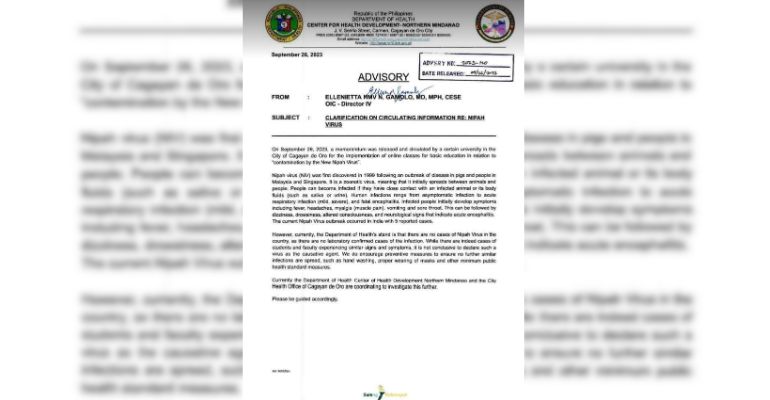On September 26, the Department of Health (DOH) confirmed that the Philippines has not recorded any cases of the Nipah Virus, in response to the recent concerns stirred by a university memorandum.
Earlier this week, Liceo de Cagayan University issued a memo announcing the implementation of online classes for basic education, citing concerns of “contamination by the new Nipah Virus.” The memo prompted fears and discussions on social media.
In response to this, the DOH released an advisory stating, “There are no laboratory-confirmed cases of the infection in the Philippines. While there are indeed cases of students and faculty experiencing similar signs and symptoms, it is not conclusive to declare such a virus as the causative agent.”
The memo from Liceo de Cagayan University called for all basic education classes, from Kindergarten to Grade 12, to transition to online classes effective September 27, 2023, until further notice. The university also urged faculty members to conduct their online classes on the main campus while following health and safety protocols.
Similarly, Xavier University-Ateneo de Cagayan Junior High School announced that they would switch to online classes from September 26 to 29 as a precautionary measure “to prevent further spread of the infection either viral or bacterial among students and teachers.”
Despite these actions, the DOH reassured the public that there have been no new cases of Henipavirus infection in the Philippines since 2014. The Nipah virus belongs to the Henipavirus genus and is known for its high mortality rate, ranging from 40% to 70%, with no known vaccine available.
The DOH stated, “To date, there is only one recorded case of Henipavirus infection in the country, detected in Sultan Kudarat in 2014. Based on the investigation, reported cases developed signs and symptoms after exposure to horses and/or its meat… Since then, no similar health events or suspect cases have been reported.”
Nipah virus signs and symptoms include fever, headache with changes in sensorium, cough, and difficulty breathing. It can also lead to respiratory infections, vomiting, seizures, brain inflammation, and coma in severe cases.
The virus is primarily transmitted to humans through contact with infected animals or contaminated food. Fruit bats are the natural carriers of the virus and have been linked to previous outbreaks.
While Nipah outbreaks are rare, they are considered by the World Health Organization as diseases “deserving of priority research for their potential to cause a global epidemic,” alongside diseases like Ebola, COVID-19, and Zika.
Also Read: Get Ready to Paws for Disney Magic: ‘Klarex Uy ALL BREEDS Pawshion Show and Pet Blessing’

Leave a Reply